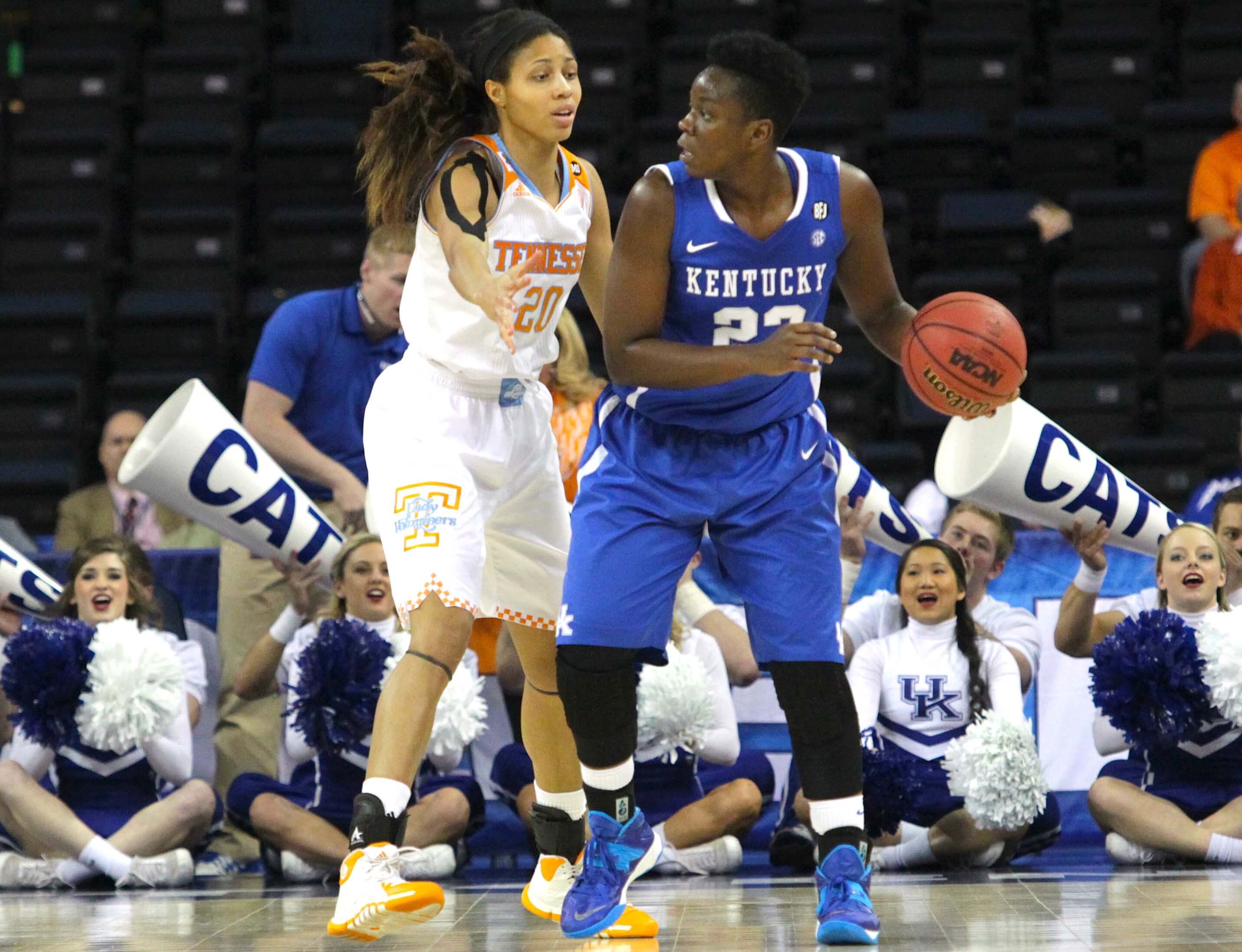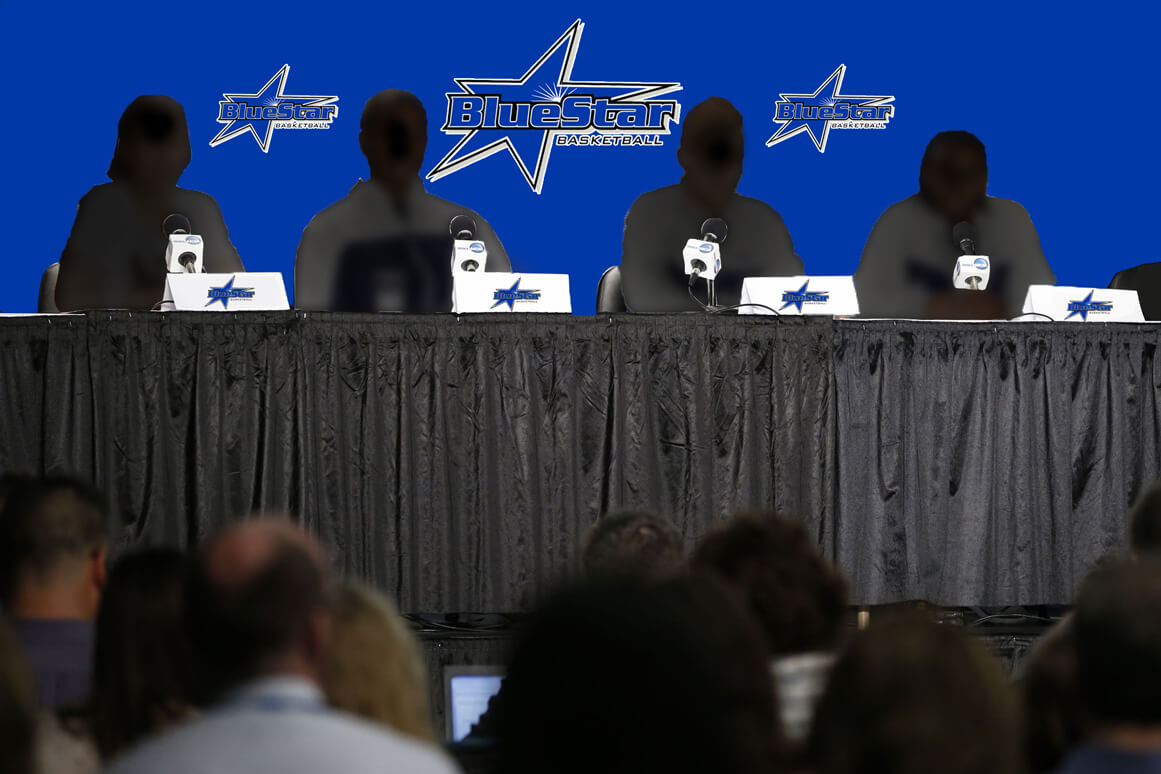
UConn transfer Samarie Walker helped Kentucky reach the 2014 SEC Tournament finals, but Matthew Mitchell’s program also has endured a high number of players and assistant coaches leaving in recent years. (Photo: Arlene Langer, IDI Sports)
With several conspiracy theories swirling around the women’s basketball world this week, there was a surprising blast of candor as well, an attempt to answer a vexing question that I think is a lot more compelling in the sport than the media focus elsewhere:
What the heck’s the matter with Kentucky?
Most of the headlines have been about Candace Parker’s omission from the U.S. Olympic team and the continuing academic fraud saga at the University of North Carolina.
Meanwhile, in Lexington, Matthew Mitchell was publicly owning up to the upheaval of a Kentucky women’s basketball program that in some ways has recently symbolized much of what has ailed, and challenged, the women’s college game.
What’s happening there illustrates, to an extent, the pressures of the high-stakes, big-money environment at the top levels of the women’s game, especially within in the last decade. Former Women’s Basketball Coaches Association CEO Beth Bass aptly described this as “the devil at the bottom of the wishing well.”
The Wildcats survived four early-season player departures to reach the Sweet 16, but getting beat in the regionals by Washington at Rupp Arena was a deflating end to what had been an encouraging season.
However, since the end of the season, two more players have transferred and a McDonald’s All-American signee has asked out of her letter of intent. More shockingly, Mitchell’s entire staff has departed, and not for the first time.
He fired one of his assistants, Adeniyi Amadou, while Tamika Williams-Jeter and Camryn Whitaker resigned this week. Mitchell re-hired Kyra Elzy, dismissed at Tennessee, and who on staff during his successful early tenure at Kentucky.
In an unusual news conference Wednesday, and in separate interviews with local media, Mitchell said responsibility falls on him and what he admitted was a chaotic management style that included communications problems, mistakes in hiring staff members and wanting to spend time with his family.
In a wide-ranging, occasionally rambling interview with Lexington Herald-Leader beat writer Jen Smith, Mitchell admitted he’s struggled to piece together a staff like the one that meshed well early in his UK tenure, attend to players individually and oversee an ambitious program that has been provided with generous resources to become one of the nation’s elite: “This is a very, very difficult time but this is not bringing me down.”
Kentucky athletics director Mitch Barnhart, who’s as publicly supportive about his women’s program and coach as any AD in the nation, expressed his confidence in Mitchell: “We’re not that far off.”
Mitchell’s current contract runs through the 2018-19 season. UK is the host of regionals the next couple of seasons, so the opportunity for the program to reach its first Women’s Final Four is there.
For now, however, Mitchell has eight players on his probable 2016-17 roster, including senior guard Makayla Epps. Elzy’s return ought to stop some of the bleeding, but what she and Mitchell may be telling recruits at this stage must seem daunting.
In a state, and at a school, where men’s and women’s basketball matters a lot, Mitchell probably had little choice but to face the cameras and microphones.
There isn’t an investigation at UK into allegations of mistreatment, as has taken place at Nebraska, and that are ongoing at Loyola-Chicago and Duke, among others.
There aren’t complaints of racial discrimination, as has happened at Illinois and now at Iowa State. Players who have left Kentucky said they were simply unhappy and wanted to play elsewhere, although that can mean a lot of things.
In a Kentucky Sports Radio interview, Mitchell denied that he was too tough on players or assistants. While that’s always going to be difficult to answer, perhaps some better questions might be: What does it take to get the culture of a program right? How do you get it back after it slips away? Can you?
“I understand that it doesn’t look good,” Mitchell said to KSR’s Matt Jones. “But I need to make sure to get closer to those people who want to be in the building.
“It’s a culmination of things that have happened but it didn’t happen in the last two weeks. . . . It’s about making sure how we’re going forward. Some players got into a situation where they didn’t want to be here.
“There are more players who wanted to be here than who want to leave. But everybody wants to talk about players who are leaving.”
With so many transfers afoot in the men’s and women’s game, Kentucky is hardly the only program to suffer from mass departures. But it is among the highest-profile schools to go through such turmoil in recent years, and for inexplicable reasons Mitchell previously said were unrelated.
When he was hired away from Morehead State in 2007, Mitchell, a former Tennessee and Florida assistant, gave a respectable UK program an energetic boost as it aimed for the SEC and national elite.
He’s been considered one of up-and-coming coaches in the country, and with a personality tailored to the media age. “The Matthew Mitchell Show” features cooking segments with his wife and things like the “Guitar Tip of the Week.” It’s funny and you can see how this helped in recruiting and building a fan base. He’s been an entertaining regular at Kentucky’s Big Blue Madness. Geno may talk a good game for the media, but Mitchell can sing and dance.
Kentucky has paid Mitchell handsomely for its aspirations. After the Wildcats twice reached the Elite Eight and posted the first 30-win season in school history in 2012, Mitchell was made the highest-paid coach in the SEC. His annual salary now is near $800,000, and additional income surpassing $1 million.
His extension came as Pat Summitt retired at Tennessee, and as I wrote at the time, the generational change in the women’s coaching ranks was beginning to settle in. Mitchell was one of the most promising examples of this younger wave. I still think he is, and I know a lot of people in the game would love to see him right the ship at UK.
What I didn’t understand then was the cultural change afoot with a younger generation of players that many coaches have admitted they are struggling to reach.
In a blistering piece this week at ESPN.com, boys talent evaluator Dave Telep wrote about the “entitlement culture” in youth basketball that he believes is getting worse. Since he started scouting in 1997, he noted, “I’ve witnessed a gradual decline in the attitudes of the players, the priorities of their parents and the overall state of the game.”
Nearly every day at the Women’s Final Four, UConn coach Geno Auriemma echoed similar sentiments.
In the women’s game, this disconnect can help explain, to some degree, the rash of transfers and complaints of mistreatment and lawsuits at all levels of the sport. For Kentucky women’s basketball, the issues have been different, but no less perplexing.
In her first comments since leaving Kentucky early in the season, Kyvin Goodin-Rogers, now at Western Kentucky, said this week that point guard Linnae Harper “was our lock that held us together.” When Harper transferred, eventually to Ohio State, a lot of team camaraderie began to unravel.
The Wildcats were missing it on the court because they were missing it on the coaching staff.
For his part, Mitchell said he’s unwavering in his efforts to revitalize his staff and sign players who want to be at Kentucky. Bringing back Elzy, he said, is “the first step in us moving it forward.” He also understands why some may be skeptical of these pledges after all that’s happened.
“If people have doubts, that is understandable,” he said in the KSR interview. “I am in firm belief of the direction we’re going. This difficult time is going to strengthen us.”
Wendy Parker is a sportswriter and web editor who has covered women's basketball since the early 1990s. She is a correspondent for Basketball Times and formerly covered women's and college sports, soccer and the Olympics at The Atlanta Journal-Constitution. She is the author of "Beyond Title IX: The Cultural Laments of Women's Sports," available on Amazon, and the creator of Sports Biblio, a blog about sports books and history.




